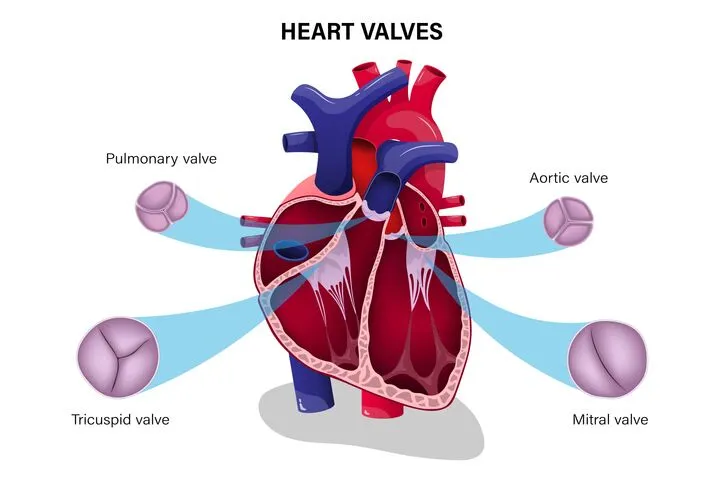 28 February, 2024
28 February, 2024
Understanding Heart Valve Surgery: Types, Procedures, and Conditions
Introduction:
Heart valve surgery is a crucial medical intervention aimed at repairing or replacing damaged heart valves. The heart’s valves play a vital role in ensuring the proper flow of blood through the heart chambers. When these valves malfunction due to diseases or congenital defects, it can lead to serious complications. In this blog post, we’ll delve into the types of heart valve surgery, conditions that may necessitate it, and the procedures involved.
Types of Heart Valves:
The heart consists of four valves, each serving a distinct function:
- Aortic Valve
- Mitral Valve
- Pulmonary Valve
- Tricuspid Valve
These valves open and close with each heartbeat, allowing blood to flow in one direction through the heart chambers and out to the rest of the body. Any impairment in the function of these valves can significantly affect heart health and overall well-being.
Types of Heart Valve Surgery:
Heart valve surgery can be categorized based on the approach used and the specific valve being addressed. Some common types include:
Aortic Valve Surgery:
- Minimally Invasive Aortic Valve Surgery
- Open Aortic Valve Surgery
Mitral Valve Surgery:
- Minimally Invasive Mitral Valve Surgery
- Open Mitral Valve Surgery
Procedures: Various procedures may be performed during heart valve surgery, depending on the patient’s condition and the extent of valve damage. These include:
- Aortic Valve Replacement: Involves replacing a diseased or damaged aortic valve with a prosthetic valve.
- Aortic Homograft: The replacement of the aortic valve using a donor valve.
- Aortic Root Replacement: Surgical repair or replacement of the aortic root, often performed in cases of aortic aneurysm.
- Balloon Aortic Valvuloplasty: A minimally invasive procedure to widen a narrowed aortic valve using a balloon catheter.
- Endovascular Stent Graft: Used in cases of aortic aneurysm to reinforce the weakened artery wall.
- Transcatheter Aortic Valve Replacement (TAVR): A minimally invasive procedure to replace a diseased aortic valve using a catheter-based approach.
Conditions Requiring Heart Valve Surgery:
Heart valve surgery may be necessary to treat various conditions, including:
- Aortic Insufficiency
- Aortic Stenosis
- Congenital Heart Valve Disease
- Mitral Regurgitation (Acute or Chronic)
- Mitral Stenosis
- Mitral Valve Prolapse
- Pulmonary Valve Stenosis
- Tricuspid Regurgitation
- Tricuspid Valve Stenosis
Can a Heart Valve Repair Itself?
While some mild valve abnormalities may improve with medication and lifestyle changes, significant valve damage often requires surgical intervention. The ability of a valve to repair itself depends on the underlying cause and extent of damage. In many cases, surgery offers the most effective long-term solution for restoring proper valve function and improving quality of life.
When is Heart Valve Surgery Necessary? Heart valve surgery is typically recommended when the valve dysfunction significantly impairs heart function or poses a risk of serious complications, such as heart failure or stroke. The decision to undergo surgery is based on various factors, including the severity of symptoms, the underlying cause of valve disease, and the patient’s overall health status.
Why Might I Need Heart Valve Repair or Replacement Surgery?
There are several reasons why heart valve repair or replacement surgery may be necessary:
- Valve Dysfunction: When heart valves become damaged or diseased, they may not open or close properly, leading to conditions such as regurgitation (leakage) or stenosis (narrowing). Surgery may be required to repair or replace the affected valve to restore normal function.
- Symptoms: Severe valve disease can cause symptoms such as chest pain, shortness of breath, fatigue, and fainting spells. If these symptoms significantly impact quality of life or indicate a risk of complications, surgery may be recommended.
- Complications: Valve disease can lead to serious complications, including heart failure, stroke, and arrhythmias. Surgery may be necessary to prevent or treat these complications.
- Congenital Defects: Some individuals are born with abnormalities in their heart valves that require surgical intervention to correct.
What Are the Risks of Heart Valve Repair or Replacement Surgery?
While heart valve surgery is generally safe and effective, it does carry certain risks, including:
- Bleeding: Surgery involves incisions in the chest, which can lead to bleeding both during and after the procedure.
- Infection: There is a risk of developing infections at the surgical site or within the heart itself.
- Blood Clots: Blood clots can form around artificial valves or in the heart chambers, increasing the risk of stroke or other complications.
- Valve Dysfunction: In some cases, repaired or replaced valves may not function properly, requiring additional procedures or interventions.
- Heart Rhythm Problems: Surgery can disrupt the heart’s electrical system, leading to arrhythmias (irregular heartbeats).
- Complications from Anesthesia: Anesthesia carries its own risks, including allergic reactions, respiratory problems, and complications related to sedation.
What Happens After Heart Valve Repair or Replacement Surgery?
After heart valve repair or replacement surgery, patients can expect a period of recovery and rehabilitation. This typically involves:
- Hospital Stay: Most patients will spend several days in the hospital following surgery to monitor their condition and manage pain and other symptoms.
- Medications: Patients may need to take medications to prevent infection, reduce inflammation, manage pain, and prevent blood clots.
- Rehabilitation: Physical therapy and cardiac rehabilitation programs may be recommended to help patients regain strength, endurance, and mobility.
- Follow-up Care: Regular follow-up appointments with a cardiologist are essential to monitor heart function, assess the effectiveness of treatment, and address any complications or concerns.
 +91 96001 07057
+91 96001 07057 Sidharam Heart Clinic Adyar, Gandhi Nagar, Canal Bank Road, Opp.St.Louis School, Adyar, Chennai, Tamil Nadu 600020
Sidharam Heart Clinic Adyar, Gandhi Nagar, Canal Bank Road, Opp.St.Louis School, Adyar, Chennai, Tamil Nadu 600020
